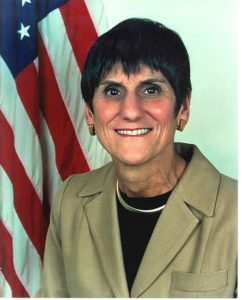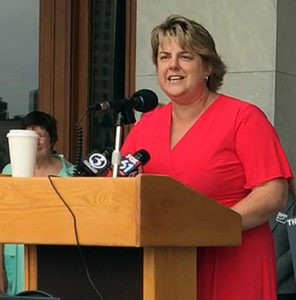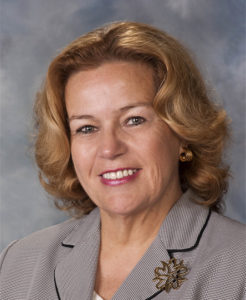 The Orange Times asked candidates running for state and federal offices in 2018 with districts that cover Milford and Orange to submit their responses to questions about issues that affect the voters in those towns. Their responses are being published in a series for the print edition.
The Orange Times asked candidates running for state and federal offices in 2018 with districts that cover Milford and Orange to submit their responses to questions about issues that affect the voters in those towns. Their responses are being published in a series for the print edition.
You can read all the questions and responses that have been published so far here. Watch for more responses as the election approaches.
Election day is Nov. 6.
Attorney General: Sue Hatfield, William Tong
Secretary of the State: Susan Chapman, Denise Merrill
Treasurer: Thad Gray, Shawn Wooden
Comptroller: Kevin Lembo, Kurt Miller
Lieutenant Governor: Susan Bysiewicz, Joe Markley
Governor: Ned Lamont, Bob Stefanowski
US Senate: Matthew Corey, Chris Murphy
US House of Representatives – District 3: Angel Cadena, Rosa DeLauro
State Senate – District 14: James Maroney, Pam Staneski
State House – District 114: Themis Klarides, Mary Welander
State House – District 117: Cindy Wolfe Boynton, Charles Ferraro
State House – District 118: Connie Jagodzinski, Kim Rose
State House – District 119: Ellen Russell Beatty, Kathleen Kennedy
Milford-Orange Probate Judge: Christopher T. Goulden, Hon. Beverly K. Streit-Kefalas
Attorney General
Consumer protection is being weakened at the federal level along with other business regulations. Where do you stand on these changes, and what will you do as attorney general to protect Connecticut residents?
Sue Hatfield – R

Sue Hatfield.
Government regulations, be they state or federal, are the way public agencies go about implementing laws. Often, however, these regulations go much further than the law itself. In such instances, unelected state and federal bureaucrats take liberties with our liberty – left unchecked, compliance with or fear of regulations can strangle innovation, hinder job growth and make us ask whether government exists to serve us or itself.
Consumer protection regulations are not immune from this “mission creep.” Indeed, consumer “protections” are a large part of the Code of Federal Regulations. That code contained 20,000 pages in 1960. Today the same code exceeds 185,000 pages – a more than nine-fold increase!
The Trump administration deserves credit for its initiative to lessen the nation’s enormous regulatory burden. I applaud the initiative to repeal two federal regulations for every new one implemented. Robust job growth, 50-year lows in unemployment, and record stock market gains are all major boons to consumers, who, at the end of the day, want little more than steady work and healthy, growing 401(k) account balances.
A similar regulatory reform effort is needed in Connecticut. This state’s regulatory burden has become enormous and is cited frequently by companies as one of the primary reasons why it is difficult to do business here. Reining in outmoded and unnecessary regulations has nothing to do with “weakening” them. On the contrary, trimming unnecessary regulations is much like losing that extra 50 pounds that is weighing you down and diminishing your lifestyle. Once the pounds are gone, you feel better and life gets easier. The parallels are identical.
As attorney general, I will be a staunch consumer advocate when companies are engaged in malfeasance or unfair practices. I will bring a unique skill set to the job as both a state prosecutor with 13 years’ experience and a registered nurse with nearly a decade working in the healthcare system. I also understand well that consumers benefit from a climate of economic competitiveness.
To that end, I will promote a level playing field for business through the fair and consistent enforcement of laws and regulations. I will establish an Office of Business Ombudsman to work with companies and avoid needless confrontation. Most importantly, I will end politically motivated, frivolous, “photo-op” lawsuits that chill job creation, cost needless tax dollars, and result in long-term economic harm by making Connecticut appear hostile to business.
Consumers will benefit from a resurgence in economic growth, one that will create more and better paying jobs; give job-seekers more positive choices; and provide households with more economic clout.
I will work closely with the Connecticut Department of Consumer Protection to crack down on bad actors. Companies that exploit rather than serve consumers will face significant penalties.
But Connecticut’s attorney general has another function that can serve consumers mightily, and that is to root out waste, fraud and other abuses that dearly cost overburdened state taxpayers. Every one of us, as taxpayers, is a consumer of state government services. I will focus like a laser on ways to make our government more responsive, less expensive, and bring more value.
I will be an open, accessible attorney general dedicated to the rule of law. Consumers can count on me to be a fierce advocate in their corner when the situation calls for it, and a champion for government efficiency in ways that will help every individual and household in the state.
William Tong – D

William Tong.
As Donald Trump’s administration guts common sense regulations designed to protect consumers and working people, it will be up to the attorney general to stand up and fight for Connecticut families. This is what I have done for 12 years as a state legislator. My consumer protection work has ranged from taking on the big banks and predatory lenders to creating a menu of options to address the crumbling foundations issue in Eastern Connecticut to helping the Department of Consumer Protection create the country’s best designed and regulated medical marijuana program to supporting the nation’s first-ever Student Loan Bill of Rights.
Donald Trump’s administration has put a target on the back of every Connecticut family and their bank account. As your attorney general, I will stand up to him and use every tool available to protect consumers, from the Connecticut Unfair Trade Practices Act to consumer protection jurisdiction granted to the states under the Dodd-Frank Act, to bringing anti-trust actions.
For example, the Trump Administration is dismantling the Consumer Financial Protection Bureau, which will give big banks free rein to take advantage of consumers like they did prior to the 2008 financial collapse. State attorneys general must step into the gap to hold financial institutions accountable. As your attorney general, I will work to create what is often referred to as a “Mini CFPB” at the state level and establish a financial fraud task force to step in and take action against any company that takes advantage of Connecticut families.
Similar to the stripping away of regulatory oversight at the CFPB, Education Secretary Betsy DeVos and the Department of Education are removing all barriers to predatory lending in higher education. When DeVos tried to stop the implementation of student loan regulations meant to protect borrowers from predatory lending practices and fraud from for-profit schools, it was 19 state attorneys general who stopped her. But this fight is not over. Attempts to take advantage of and defraud student borrowers are going unchecked by this administration and it is up to state attorneys general and state legislatures to stop them.
We are also seeing unprecedented attacks on consumers in the healthcare context. In a federal court in Texas, the Trump administration and 19 Republican attorneys general are attempting to dismantle the Affordable Care Act, a law which has cut personal bankruptcies in half. A group of Democratic attorneys general, including George Jepsen, are fighting to stop them and protect healthcare for millions of Americans. As your attorney general, I will continue to defend the ACA in this lawsuit and against any efforts to undermine legislation that ensures healthcare for hundreds of millions of Americans.
My work will also extend to continuing and broadening the office’s multi-state lawsuit against drug manufacturers for their collusion in driving up the prices of generic drugs. Healthcare costs are soaring at the same time that the Trump administration is seeking to limit access to care, and as your attorney general I will seek to do the exact opposite: reduce costs and increase access.
Finally, one of the key pieces of consumer protection objectives I will focus on as attorney general is safeguarding our personal information. With the rise of big technology, daily news of security breaches and data hacks, and our use of technology to assist in work and daily life, we must ensure that our sensitive information is safe from exploitation. Companies that use our demographic information to gain marketing advantages must be held to the highest of standards. The attorney general can not only help bring about new laws and practices in terms of data privacy, but also enforce those that already exist, such as the limit on usage of Social Security numbers.
Secretary of the State
What specifically will you do to make sure that voting is as easy, fair and secure as possible, and how will you foster greater civic engagement among Connecticut’s residents?
Susan Chapman – R

Susan Chapman.
I believe that every Connecticut resident who is eligible to vote should have easy voting access to exercise their constitutional right. I also believe that elections must be fair, conducted with integrity and deserving of the public trust. Voters need to feel confident that their vote was counted along with every other eligible voter.
To ensure integrity of the voting process, we must also protect the voter information from misuse. Today, for just $300, the Secretary of the State’s office will sell anyone’s personal voter registration information that includes birth dates. The Connecticut state voter system must be hardened and protected from abuse, but it doesn’t help if the same information that is being protected is offered for sale by the state. The time is well past due to ensure the integrity of the voting systems in the state and only this year have some small steps been made toward that goal. This should have been addressed and made a priority many years ago.
I am a strong advocate for making it easier for our residents serving in the military, particularly overseas, to have easier access to vote. I am fighting for the voting rights of our service members because they are fighting for all of our rights to live in a free country where we have the right to vote. Today, the State of Connecticut does the bare minimum to help our residents serving in the military. Due to an outdated voter process that requires military members to print out and mail a paper ballot within a short time frame, many of our residents serving in the military overseas are denied their right to vote. For example, for those serving on a ship or deployed to the field, mailing a paper ballot within a short time frame is all but impossible. If the ballot does not arrive in time by mail, the vote is thrown out and not counted. The residents of Connecticut should be concerned about how our residents serving in the military are treated.
Other states have been more progressive than Connecticut when it comes to ensuring military members are given the opportunity to exercise their right to vote and be counted. Our military members need the flexibility to have more than one way to vote. Technology exists today that will allow the military members to vote in a secure manner that maintains the integrity of the voting process. Other states do this, but the current secretary of the state will not even consider allowing our residents serving in the military to exercise their voting rights using the latest advances in secure technology. The current secretary of the state is more focused on making it easier for convicted felons on parole to vote than our own military.
There is a saying that “all politics is local.” As the former first selectman of New Fairfield, I was able to witness the local voting process and the challenges first-hand. Greater civic engagement begins at the local level with all of our 169 municipalities. The secretary of the state must be more actively involved and become more of a leader to work cooperatively with all of the town clerks and registrars of voters across the state. As secretary of the state, I would engage more with the registrars of voters and town clerks across the state by ensuring they have what they need to conduct our elections.
The secretary of the state needs to provide workshops, more collaboration and better technology that will facilitate increased civic engagement at the local level that will translate into more statewide civic engagement. Over the past year, I have spoken to many town clerks and registrars of voters across the state and many of them have great ideas on how to increase civic engagement and how to make the voting process as easy, fair and secure as possible. Connecticut needs a secretary of the state who will listen to the registrars of voters and the town clerks in our 169 municipalities to implement positive change and become a leader in using the latest secure technology to modernize voting in Connecticut.
Denise Merrill – D

Denise Merrill
During my terms as the secretary of the state I have taken a number of steps to increase voter participation. We have seen record numbers of registrants for this midterm election. I have worked hard to reach out to voters in non-traditional locations such as food drives and through new active civic groups. Bringing accessibility to voting is one of my top priorities. I am one of the nationwide leaders on combating cyber-security attacks and serve on nationwide task forces that are working to make sure that not only our vote, but our voters remain safe. Voter privacy is of the utmost concern to my office. There is nothing more important to me than ensuring that everyone has access to voting.
Treasurer
What are your strategies for state bonding and investments, and how will you work as treasurer to ease the burdens of the state’s pension obligations?
Thad Gray – R

Thad Gray.
I’m running for State Treasurer for one reason – to help restore the financial stability of the State of Connecticut. It’s been an honor to travel Connecticut and listen to voters about their concerns regarding the decades of fiscal mismanagement. Politicians in Hartford have played politics with the safety and security of taxpayers’ money.
The treasurer, as Connecticut’s chief financial officer, is the “sole fiduciary” of a diverse $42.3 billion portfolio of state funds. This is a very serious responsibility that demands sophisticated knowledge of the financial markets, training and education. I have held a similar executive level role, chief investment officer, for a decade during my 35-year career. The largest portion of the portfolio is the state pension funds that provide for the retirement security of teachers, public safety workers and state employees.
After assuming office, I will immediately take a fresh look at policies, procedures and planning with respect to the state’s investments. I will evaluate all 159 asset managers to determine which ones have achieved performance goals and which ones have lagged their benchmarks. I will also review fees charged by every investment management firm to assess whether they are fair and justified.
I believe that the investment return on Connecticut’s pension assets can improve from their current levels. For decades, Connecticut’s performance has ranked substantially below the median performance of other large public pension plans in the United States. Indeed, the mediocre performance compounded over decades has contributed to the large and growing unfunded liability.
Additionally, the treasurer holds important seats on over 20 boards and commissions including the State Bond Commission. I am a firm believer that bonding must be focused on long-term capital improvement projects – schools, roads, bridges and other vital transportation infrastructure. Bonding should not be used to pay for the state’s operating expenses or projects that should be funded and prioritized at the local level.
Furthermore, we must remember that all financial transactions are interrelated. Decades of irresponsible bonding have damaged Connecticut’s credit rating, which is currently the third lowest in the United States. This means money is more expensive to borrow and the higher cost is passed down to every taxpayer. I will demand responsible bonding policies regardless of which party controls the governor’s mansion or the legislature. I have been vocal on this issue throughout my campaign, whereas my opponent has been virtually silent.
Connecticut’s massive unfunded pension liabilities and projected budget deficit are threats to our state’s long-term financial security. While the Treasurer doesn’t have a vote on the budget, I can provide financial advice regarding the implementation of reforms needed to balance our budget and strengthen our pension funds. As an example, the assumptions that are being used to project investment returns are set artificially high, especially for the Teachers’ Retirement System. The treasurer must speak up when pensioners and taxpayers are being misled with irresponsible projections and phony accounting. Without an accurate diagnosis of our pension problems, it is impossible to develop an effective solution. The treasurer must work with the next governor and legislators to put forward solutions that will be necessary to close the large and growing gap between assets and liabilities.
Connecticut can only prosper if we maintain our commitment to pensioners and taxpayers with professional management, leadership, accountability and integrity. It’s time to get serious about the challenges that face Connecticut. I understand the duties of the Office of Treasurer, I have the experience, competence and vision to serve, and I ask for your vote on Tuesday, Nov. 6.
Shawn Wooden – D

Shawn Wooden.
My life’s work in both the private and public sectors has been protecting and maximizing the savings of working people and their retirement security.
I’ve been an investment attorney for 20 years and I lead my firm’s public pension plan investment practice.
That experience has fully prepared me to do the same for Connecticut workers and residents impacted by the Treasurer’s investments and the nearly $60 billion in public assets under the office’s purview.
As Treasurer, I will invest pension funds in ways that improve returns over the long term, not only for the benefit of workers and retirees who depend on them, but also for the benefit of taxpayers who fund them.
I see the Treasurer’s job as being much more than the state’s chief stock-picker.
The office has a duty to maximize investment returns and minimize risk to the pension funds.
But I strongly believe the Treasurer’s investments should reflect and execute our shared priorities to move our state forward.
That is why the focus of my service as Treasurer and on the Bond Commission will be on investing in the right priorities – creating jobs, improving our infrastructure and strengthening pay equity and our education system.
I’ve been committed to public service my entire adult life.
I served as Hartford’s council president, where I stood up to the mayor of my own party and learned the hard lessons of balancing a budget, protecting workers and navigating some of the toughest times our capital city has seen.
As Treasurer, I will use my voice to hold the governor and the legislature accountable when it comes to funding the pension funds.
The first order of business is to have fiscal discipline on an annual basis.
I also believe it may be time to start contributing assets to the pension funds in order to ensure they are fully funded without putting more burden on taxpayers.
Connecticut is facing enormous fiscal challenges and I have the experience, values and vision to help the governor and the legislature address them.
I am running to serve as State Treasurer because I believe I can make a difference in Connecticut’s economy and the retirement security of working people.
Our state is very much in need of a new direction that will create an environment where all our residents can thrive – and I look forward to helping us move in that new direction as the next State Treasurer.
Comptroller
What experience with money management do you bring to the state as comptroller, and what is your philosophy when it comes to handling state funds?
Kevin Lembo – D

Kevin Lembo.
The position of state comptroller demands someone with the ability and the will to compel fiscal responsibility, even if that means standing up to members of your own party. When the governor tried to give the world’s largest hedge fund a $22 million tax giveaway, I spoke out against it. When drug companies sent prescription drug prices through the roof, I spoke out and got a law passed to crack down on drug price gouging. And as state comptroller I have implemented cost savings that in total save the state approximately $200 million annually by managing the state health plan better, eliminating waste and fraud and by doing more with less.
Kurt Miller – R

Kurt Miller
Connecticut’s current poor financial standing cannot be overstated. The state is drowning in debt, staring tens of billions of dollars in unfunded pensions and healthcare retirement benefits in the face, and has a bond rating that is approaching junk status. Combined with an operating budget that is billions out of balance seemingly on an annual basis, the future can appear to bleak for our great state.
Everywhere I go while campaigning across our state, I hear stories from people of all economic means and backgrounds talking about their concerns for maintaining the high quality of life we are used to in Connecticut, whether it’s declining property values, the threat of tolls being put in all over the state, or the high tax burden that is crushing our families and taking away job opportunities.
In recent days and weeks, we’ve seen and heard about the lack of institutional controls that have enabled the runaway spending in Hartford. We’ve read about the $10.6 million that walked away from the state prescription drug plan that is administered by our current state comptroller. We’ve seen our state comptroller mindlessly rubber-stamp hundreds of millions of dollars in spending on things like splash pads and state-sponsored supermarkets. Enough is enough. It’s time to send some qualified adults to Hartford to mind the store.
Fortunately, it doesn’t have to remain this way. If we send new people to Hartford with financial expertise and experience, Connecticut can once again be the envy of New England. That is why I am running for state comptroller. My experience and background in the financial services industry, as a business owner and as a chief elected official uniquely qualifies me to be the agent of change we need in the comptroller’s office in Hartford.
Over the years, I was able to achieve many professional designations, including the National Association of Insurance and Financial Advisors Life Underwriter Training Council Fellow and Chartered Mutual Fund Counselor. I also held the National Association of Securities Dealers Series 6, 63 and 65-Uniform Investment Adviser licenses and was insurance licensed in life, health, variable annuity, property and casualty. As a result of my training, I was able to advise and assist many companies in how to better fund and manage their retirement funds.
Upon election as first selectman in 2011, my team and I focused all of the knowledge and experience I had gained over the 18 years prior to improving and strengthening Seymour’s finances. When I took office, Seymour had a low fund balance of just over 5 percent, growing debt ratios near 10 percent, a shaky AA– bond rating, crumbling infrastructure, a mill rate that was growing each year due to increasing expenses and shrinking tax receipts. The situation was similar to the mess our state is in, even if on a smaller scale.
After implementing a 10-year strategic plan. This cohesive plan put Seymour on a path forward to not only provide better services to its residents, but to strengthen its core financials. Over the last six years, the fund balance has grown to just under 13 percent, debt ratios have steadily decreased to 6 percent, the bond rating has increased to a near perfect AA+ and the town’s mill rate has remained level for the last three years. All of these changes have come along with historic investment in the town’s infrastructure as well as a drastic decrease in its outstanding long-term liability costs in health care and retirement.
We can accomplish similar things for the State of Connecticut. It will take a change in both the people and the tax-and-spend philosophy that currently exists in Hartford. There is no doubt a battle lies ahead, but there can also be no doubt that, with your help, we will save Connecticut.
Lieutenant Governor
The lieutenant governor is only a breath away from the top position in the state. What qualifies you to be given the responsibility of being governor should that happen, and how will you help your running mate manage the daunting task of running the state?
Susan Bysiewicz – D

Susan Bysiewicz.
My name is Susan Bysiewicz. I’m a business lawyer who has helped over 80 small businesses create thousands of jobs. I’m a former secretary of the state and state legislator. And, as gubernatorial candidate Ned Lamont’s running mate, I’m asking for your vote to serve as Connecticut’s next lieutenant governor on Tuesday, Nov. 6.
Here’s my story: I grew up on a potato farm in Middletown, Connecticut – the daughter of a World War II veteran and a teacher – and attended Middletown public schools.
Whether it was at home or in school, I was taught from an early age to always fight for what’s right and to stand up for working families.
That’s what I did as a state representative, leading the charge on legislation to ban “drive-through” mastectomies, and ensuring that women being treated for breast cancer were given proper care.
It’s also what I did as secretary of the state, helping thousands of businesses grow, cutting bureaucratic red tape, honoring veterans, and registering thousands of voters.
And it’s what I’ve done as a business lawyer and job creator, helping over 50 companies access millions of dollars in capital, expand their businesses and create hundreds of jobs in our state.
As the mother of three kids who grew up in Middletown, attending public schools there, too – and with all three of them recently graduating from college – I decided to run for lieutenant governor.
I love Connecticut. It’s my home, and like so many Nutmeg State residents, I want to make sure that our state is reaching its full potential.
But, unfortunately, right now that’s not happening.
Today, Connecticut has the slowest post-recession job growth of any state in New England, and more than two-thirds of our roads are in poor or mediocre condition.
We can do better.
That’s why I’m running for lieutenant governor: Because Connecticut is at a crossroads, and the next lieutenant governor will help determine whether our kids and grandkids will be able to get good-paying jobs and raise their families here, too.
As governor and lieutenant governor, Ned Lamont and I will lead the charge to help create good paying jobs so families can thrive and our children will stay here.
We will also fight to ensure equal pay for equal work, safeguard access to affordable health care and a woman’s right to choose, improve our state’s infrastructure, protect our students from senseless gun violence and strengthen the school-to-work pipeline.
I can’t wait to get Connecticut working again for your kids, my kids, and for generations to come.
Joe Markley – R

Joe Markley.
Two hours before dawn on Aug. 22, 1991, a tie vote in the state Senate was broken by Lowell Weicker’s lieutenant governor, who by her action guaranteed that a state income tax would be imposed on the people of Connecticut. The spending spree enabled by that infamous vote was the chief cause of our subsequent economic decline. Since the tax took effect, we rank dead last in economic growth among the fifty states.
Fast forward to Aug. 1, 2017: Lt. Gov. Nancy Wyman casts the deciding vote to break an 18-18 deadlock and approve Gov. Dan Malloy’s SEBAC union deal, locking in pay raises, benefits, and no-layoff provisions until 2027, and threatening Connecticut taxpayers with escalating costs and ongoing budget crises for at least another decade.
It matters who breaks ties in the Connecticut Senate. With that chamber split 18-18 between Democrats and Republicans, tie votes have occurred nearly 40 times in two years.
I’m running for lieutenant governor to be taxpayers’ last line of defense.
I stand for limited government, individual freedom, and the rights of law-abiding citizens. As lieutenant governor, and in the role of president of the state Senate, I will work to block tax increases and excessive spending, lessen regulations and mandates, and turn back attacks on our personal liberties.
As spelled out in Connecticut’s constitution, the lieutenant governor stands in for the governor if he or she is absent from the state or temporarily unable to serve. In the unfortunate event that a governor dies, resigns, or is removed from office, the lieutenant governor becomes governor. During legislative sessions, the lieutenant governor moderates the debate in the Senate, puts questions to a vote, rules on parliamentary questions, and refers bills to committees.
Aside from specified constitutional duties, the governor often relies on the lieutenant governor for policy advice, and typically asks the lieutenant to chair or serve on various state boards, commissions and task forces.
To that end, I will seek to serve as an economic competitiveness and business advocate to the governor. I see the lieutenant governor’s office functioning as a clearinghouse for thoughtful ideas on how state agencies can work to improve the statutory and regulatory climate for business and entrepreneurs, while placing a high value on service to taxpayers. To borrow an acronym from the private sector, we need to make the state “ETDBW” – Easy To Do Business With.
Most importantly, we must show that Connecticut is no longer hostile to those willing to invest capital, create jobs, and live here in retirement.
The new state administration elected this November must signal, in word and deed, that Connecticut has left the wreckage of the Malloy years behind. Every effort must be focused on demonstrating respect for taxpayers – individual and business alike. State officials must shed any semblance of arrogance and admit the critical need to put in place policies that will attract and retain business and wealth, and stop the outmigration of families, retirees, and young talent.
The lieutenant governor has a vital role to play in the restoration of Connecticut’s proud reputation as a place of choice. Our state is worth the fight. I invite you to look carefully at the records of those seeking this office, as there are important differences in experience and outlook. Decide who you can trust – implicitly – to serve as a firewall between you and the tax-and-spend crowd at the State Capitol.
If you believe in smaller government, lower taxes, and greater personal liberty, I am your candidate, and I would be honored by your support,
I invite you to visit my website at MarkleyforLG.com for more information, and to reach out with any questions you may have about my candidacy or my stands on the issues.
Governor
The future governor faces a slew of challenges in the coming years – none more pressing than the state’s budgetary situation. What specifically will you do to put Connecticut on a sounder fiscal footing while helping cities and towns to thrive?
Ned Lamont – D

Ned Lamont.
Editor’s Note: Despite numerous attempts to reach out to Ned Lamont’s campaign, no response was provided by press time.
Bob Stefanowski – R

Bob Stefanowski.
Budget crisis: As governor, I will first and foremost ensure we are being responsible with taxpayer money. We are in a budget crisis. We shouldn’t be spending money on racquetball courts, 8-million-dollar grocery stores, or buying land from Democratic donors for 10 times the appraised value. Through cutting waste, fraud, and abuse I am confident that I can conservatively cut at least 5 percent in cost from state government. That would be $1 billion right off the bat.
Second, we aren’t currently collecting all of the sales tax that is due us. If we fully implement our sales tax collections, we can recover at least $230 million in revenue that is currently going uncollected.
I’ve had a successful career finding savings where others thought we couldn’t. At UBS, I instituted a policy of zero-based budgeting, which saved billions of dollars in the first year alone.
We also need to negotiate in good faith with the unions on pensions. We have had a governor who refuses to level with the unions, and Ned Lamont has already shown he’d rather cozy up to the unions than find a meaningful solution to this problem. We have more than $53 billion in pension and retiree health obligations. It’s not the fault of those folks who have worked their whole lives expecting the government to keep its part of the bargain. The government just refused to pay its part. We need to get everyone to the table to come up with a solution that is fair to retirees and gives them some certainty and security that their retirement is going to be there, but is also fair to the taxpayers and won’t completely bankrupt every other government program.
Growing our cities: Before the income tax, we were the fastest growing economy in the nation. Now we are second from the bottom. How have we fallen so far? We are taxing the life out of our economy. Over the last eight years, Gov. Dannel P. Malloy raised taxes by $2.5 billion; the result of every single tax increase has been an exodus of jobs and people to other states. Eighty people are leaving Connecticut every day. Our tax base is shrinking, which is hampering our ability to invest in our priorities, like education and infrastructure.
You may have heard my opponent’s false claims that my plan cuts funding for the municipalities. That’s absolutely not true. I criticized Go. Malloy for cutting aid to our towns and cities, and I will continue to fund them. We absolutely must ensure that our cities grow and prosper if we want to revitalize our state.
How do we do it? We attract businesses. While the national GDP grew over the last eight years, Connecticut’s had shrunk. We are the only state that hasn’t recovered from the Great Recession. Instead, we’ve seen over 100,000 people move out. Businesses are leaving, our graduates are leaving.
It has to end if we want to save our state. My plan is to phase out the corporate tax so businesses have a competitive advantage over our neighbors. I want to eliminate the income tax so our working families can keep what they make. It won’t be done overnight – it will be phased out over eight years and would be tied to economic triggers, so that we cut the tax burden as we can afford to, as opposed to ripping it all out at once. This plan would bring relief that our residents deserve.
Our cities are hubs for young people. They want vibrant and exciting places to be, with walkable cities and plenty of fun activities available nearby. Our cities can offer much of that. I will work to attract young families to Connecticut by promoting downtown growth and economic development that creates vibrant thriving cities that we can be proud of.
Affordable Housing: The Department of Housing plays a critical role, and I would work to ensure they are empowered to succeed. Affordable housing is a major factor in making sure our economy works for everyone. It was reported that affordable housing apartment units in some development projects cost almost $250,000 per unit to build because of unnecessary regulations and inefficiency. That’s the cost of a house.
We need to make sure that developers use funding efficiently, so we can help as many people as possible. While it’s great that affordable housing is approached on a statewide basis, the problem is one that most heavily affects cities and the distribution of affordable housing needs to be focused where the greatest need is.
Education: The foundation to success for any municipality, including our cities, is our youth. Education is extremely important to me and I had not forgotten how New Haven Public Schools set me in the right direction to succeed in life.
School choice is an important concept. It has done wonders for our cities. New Haven boasts one of the country’s best charter schools, Amistad Academy. Just recently, two charter schools have been approved by municipalities and are being considered by the state – one in Norwalk and one in Danbury. As governor, I will support our charter schools.
I believe that we have to ensure that education starts at an early stage and it starts at home. We need to promote family and parental involvement because that is where the child’s first lessons occur in life. I will work with our local communities and nonprofits to establish better mentorship programs, particularly for single-parent families and broken families. I will invest in early childhood education programs and afterschool programs to help kids achieve their educational goals.
We all value work and the importance of jobs. How do you accomplish that when the cost of daycare is so much? If we want to give people a hand up, we need to continue funding important programs like Care-4-Kids, which helps parents work while their kids are in daycare.
We need to do a better job in recruiting minority teachers. Data shows that over 40 percent of public school students are of color, yet only 8 percent of educators are of color. I need your help in making our education system more diverse and giving all our kids role models they can look up to.
Jobs: I believe that we need to fix our infrastructure, lower our cost of living, cut taxes and reduce our regulations. This will bring businesses and jobs back to our cities.
We need to foster direct collaboration between the state, our schools and the business community to get students more hands-on experience and training. This will allow us to create a pipeline that ensures we are producing the workforce that has the skills that our businesses need to grow and succeed.
We also need to strengthen our tech schools to offer a clearer path for those who don’t want to pursue traditional college an opportunity to jobs that are in high demand.
We need to protect our youth summer employment programs.
US Senate
The US Senate is nearly evenly divided. It is likely to remain close in the next session regardless of who holds the majority. Which items from President Trump’s administration do you think you can as work as senator to support, and which do you see yourself opposing?
Matthew Corey – R

Matthew Corey.
I am anxious to work with President Trump – and all in Washington, D.C. – on key nationally important issues such as further tax reform, international trade agreements, and the streamlining of redundant, unnecessary or burdensome regulations that will help us to grow our economy, create more and better-paying jobs for Americans, and a more level playing field for our businesses and workers.
We have already seen the tangible real benefits of tax reform, and yet the tax code is still too cumbersome and unwieldy. Just imagine the productivity that could be unleashed in our country is we could simplify even more the tax filing and collection process.
It just seems to me that hard-working Americans and small business owners should be encouraged to focus on what they do best, which is providing superior products and services, and not waste valuable time and resources on complying with an impossibly complex tax code.
I would especially like to encourage and foster innovation in our businesses and industries, and apprenticeship programs for our youth, as well as lifetime learning opportunities for adults who are honing and retooling their skills so they can better compete and win in a global economy.
Immigration reform is another important goal, but the reform must be real, effective, compassionate and fair. This goal has eluded our elected representatives for far too long and it is long past time to address and solve this problem. I will work with all sides on this immigration and border security as I simply cannot justify the continued status quo.
I believe we must support our armed forces and veterans – especially their right to adequate health care.
I do not believe that a bigger federal government is automatically a better federal government. In fact, I think exactly the opposite. We must take steps to first slow and then eventually reverse the inexorable growth of government. I will work with all who share this view, and I will oppose those who simple want to tax and borrow and spend.
That formula has been a disaster here in Connecticut over the past eight years and the very last thing I want to do is export our mistakes to the nation as a whole.
Chris Murphy – D

Chris Murphy.
Serving as Connecticut’s US Senator has been the honor of my life. For the last six years, I’ve travelled across the state – visiting small businesses, holding town halls, and listening to people’s feedback on what I can do in Washington to improve their lives. These conversations with Connecticut residents drive my work in the Senate. I’m working with President Trump when he’s helping Connecticut and I’m fighting him like hell when he’s going against our values and hurting Connecticut residents.
When President Trump first got into office, I reached out to him to work on fixing our broken Buy American laws. Here in Connecticut, manufacturing is driven by our defense and aerospace sectors. I am the leading proponent of fixing our Buy American laws to make sure government contracts result in work for the thousands of smaller factories and machine shops in our state. These laws are designed to ensure taxpayer dollars purchase goods made by American workers, but they are riddled with loopholes. I’ve been working on this issue since I was in the US House of Representatives.
When President Trump was elected, I wanted to hold him to his campaign promises of boosting US manufacturing. During the first week of his presidency, I sent him five executive orders he could implement immediately to fix our broken Buy American laws and boost manufacturing. I’m proud to say he put in place a few of my proposals. I’ve continued to work with the Trump administration on Buy American policies, including going to the White House for meetings and introducing a bipartisan bill to improve transparency called The Buy American Act. As long as there is an opportunity to support Connecticut jobs, I’ll work with the administration on this issue.
Additionally, I support efforts to improve our transportation infrastructure. President Trump campaigned on a $1 trillion infrastructure proposal. Unfortunately, he failed to follow through on it once in office, and has only offered up a poorly-thought out plan to privatize a big chunk of our national infrastructure. But the idea of a massive infrastructure bill made up of direct federal investments still has a lot of merit and could be a game-changer for Connecticut’s economy. If President Trump decides to change course and make good on the promise he campaigned on, I would gladly work with him to rebuild our crumbling roads, bridges and other infrastructure needs.
However, President Trump has also done a lot of things that hurt Connecticut and go against our values. I want to focus on two issues: health care and the recent tax bill. I adamantly oppose President Trump’s current sabotage of our health care system. One of President Trump’s first campaign promises was to permanently repeal the Affordable Care Act’s protections for patients. I was proud to fight alongside the millions of Americans who spoke out against these efforts that would have stripped health care from millions of families, discriminated against people with preexisting conditions, and increase health care costs. Despite the failure of the repeal legislation, President Trump is still waging a daily attack to sabotage our health care system. He repealed the coverage requirement, which drove up costs, and permitted the sale of “junk plans,” which can discriminate against people with preexisting conditions and may not cover all of the services that people need. I’m committed to working in a bipartisan manner to lower health care costs and make prescription drugs more affordable, but I adamantly oppose the actions of the Trump administration, which are hurting families in Connecticut.
I also oppose President Trump and congressional Republicans’ tax bill, which was one of the largest tax increases on middle-class families in Connecticut. The tax bill resulted in a $2.8 billion tax increase on Connecticut. Specifically, Connecticut taxpayers lost $10.3 billion in deductions under the law, which capped state and local tax deductions at $10,000. Additionally, it raises the deficit by $1.4 trillion over the next 10 years and is loaded with giveaways and loopholes for billionaires and wealthy corporations. Minor tax breaks for middle and low-income families expire after just three years, while the giant tax cuts for the wealthiest Americans and corporations remain. I’m fighting to repeal this tax giveaway to corporations and the ultra-wealthy, and instead use that money to lower the tax burden for Connecticut families and make investments in education and transportation infrastructure.
US House of Representatives – District 3
How has the US Congress been successful in meeting Connecticut’s needs in recent years, and how has it failed? What will you do over the next two years to advocate for those needs?
Angel Cadena – R

Angel Cadena.
US Congress, success and Connecticut are words that should not be utilized in any combination within any questions being asked of a Congressional challenger. If there were suitable successes I would not be utilizing my limited time on this planet trying to unseat a 28-year incumbent who has turned exactly zero ideas into a law. A legislator who has never legislated. A legislator who has the total support of a media that seem to be content with political bluster and rhetoric rather than actual solutions to our issues. A thousand times over – a piece of legislation has been submitted on behalf of a constituent, given a false sense of accomplishment in the media, and left useless in the Congressional trash heap of history never to see the light of day.
While deployed in Afghanistan I shared a single idea which was quickly turned into a federal law. This law tipped the unemployment rate into positive territory and assisted in building a solid foundation for the booming economy we are experiencing today. But I don’t color my hair. I don’t wear abnormally shaped glasses or wear odd clothing. In short, I don’t particularly stick out.
The needs of Connecticut will be the needs of the country in the coming decades. I see what needs to be fixed and exactly how to fix it. First, we need to use the full potential of our technology to make the economy as efficient as possible. Imagine an economy so efficient that you get paid the moment you finish work, money in your pocket every day, instead of waiting weeks for the fruits of your labor to materialize. Imagine all your bills, taxes and debts being paid automatically on a daily basis: no more late fees, no more overdraft fees, freeing over a trillion dollars in revenue which will also boost the state tax rolls so that we can pay for everything that has been promised. Imagine being able to effortlessly combine home expenses with roommates and family through a phone app. A type of virtual reality socialism which uses capitalism as the foundation. You will have the choice to participate in these groups or to power through as an individual. Your wealth and debt transformed with the push of a button.
I also envision a bridge across the Long Island Sound as an extension of I-91 and relieving the New York bottleneck, which costs us countless billions of dollars in lost productivity. I see a New Haven station on the first hyper-loop corridor between Boston and Washington, DC with equally spaced stops in New York and Philadelphia moving people and products from destination to destination in mere minutes. I see Connecticut leading America and inspiring the world well into the next century.
Or I guess you can just vote for the colored hair again.
Rosa DeLauro – D

Rosa DeLauro.
This is a critical time for our nation and people are struggling. Healthcare, child care, and housing costs are rising, while wages are flat. Yet the politicians – who control the White House and both chambers of Congress – have refused to work with the other party and say you’ve never had it so good.
Instead, they cut a corrupt deal behind closed doors to give a $1.5 trillion tax cut to the wealthiest Americans and corporations, and their leaders have announced plans to cut Social Security, Medicare and Medicaid to pay for it. They made health insurance unaffordable and are leaving those with preexisting conditions without insurance. They are hollowing out our federal agencies that try to ensure equal pay for women, food safety and protect our environment.
That is wrong, and why I am working every day for working people and the middle class.
In 2016 and 2017, my office worked on 2,941 cases where people struggled with issues like their Social Security or veterans benefits. In doing so, we helped constituents obtain $1.9 million in one-time payments – like retroactive Social Security benefits and tax refunds – and $750,000 in recurring benefits like monthly workers compensation and veterans benefits.
I also fought successfully for federal programs that help people get ahead as the lead Democrat on the subcommittee that funds labor, health, and education programs.
For example, the opioid epidemic killed 1,038 people in Connecticut last year alone. So I fought to secure nearly $1.9 billion for the Substance Abuse and Mental Health Services Administration and $1.5 billion for State Opioid Grants to support treatment, prevention, emergency response and law enforcement.
I am working to help families suffering from this and from diseases like cancer or Alzheimer’s. I helped secure a historic $5 billion increase for the National Institutes of Health and their groundbreaking research.
It is not just health. I also got significantly more investments in our children by securing billions in new funding for Head Start, Early Head Start, the Title I program for disadvantaged students, afterschool programs, and Pell grants. And I won a historic $2.4 billion increase in the Child Care Development Block Grant, which will expand access to child care for low-income families and children with special needs.
In addition to health, education, and child care, I am proud of what we accomplished for jobs and wages. I secured an additional $145 million for career and technical education programs, and $65 million more for registered apprenticeships.
At the same time, I secured critical funding for defense programs at home that support tens of thousands of good-paying jobs at Sikorsky, Pratt and Whitney, and small businesses in the defense supply chain. Among the highlights are a $156 million increase for 8 more Black Hawks, $1 billion for 8 CH-53K heavy-lift helicopters, $660 million for 10 Combat rescue helicopters, and $2.3 billion for 15 KC-46 tanker aircrafts. These investments reinforce family-sustaining jobs that promote our national defense.
I believe we must do better for those who built our country and sacrificed so much: our seniors. The Low Income Home Energy Assistance Program and Meals on Wheels provide them heat and nutritious meals. Even more, they provide dignity. We provided $300 million more for LIHEAP and $69 million more for senior nutrition programs.
But we can do so much more. If my Democratic colleagues take the majority, we can rewrite the rules for working people and the middle class.
My agenda goes after the corruption and the big money, lowers the cost of prescription drugs, invests in our infrastructure and jobs, and changes our trade agreements to eliminate outsourcing and increase wages.
We have evidence of what we can build together. The new Wallingford Train Station opened this May. I was proud to fight for more than $190 million in federal aid to build it. That is the type of investment we must be making. If Democrats win the House, I will seek to become chair of the Labor, Health and Human Services, and Education Appropriations Subcommittee to support investments like that for Connecticut’s third district – long-term investments in education and infrastructure, and more immediate improvements like paid family and medical leave, paid sick days, equal pay for women and fair scheduling policies.
I am proud of what I have accomplished against great odds and gridlock. If the voters of the third district of Connecticut entrust me with another term, I know we can build on our successes and continue the fight for working families and the vulnerable.
State Senate – District 14
Connecticut’s budget deficit is expected to be over $4 billion in the next two years. At the same time, state money for education and aid to Orange and Milford has been slashed. What specifically will you do to improve the state’s fiscal situation while helping the towns?
James Maroney – D

James Maroney.
It’s no secret: Connecticut’s finances are not in great shape. For far too many years too many members of the General Assembly and governors of both political parties – Republicans and Democrats – have kicked the proverbial fiscal can down the road. As a result, Connecticut’s budget is in the midst of a fiscal reckoning. With forecasted deficits reaching into the billons over the next two years, this is going to require an all-hands-on-deck approach.
First, we need to ensure that we are protecting the quality of life in our communities. A lot of us were attracted to Orange and Milford because of the quality of their schools and the quality of life our towns offer. If I am elected to the Senate I will fight to protect aid to cities and towns, hold the line on property taxes and fund our local schools so that our kids are prepared for college and jobs in the modern economy. I will do this by working to deliver balanced budgets.
In order to put the state’s fiscal house in order we need to avoid repeating the mistakes of the past. For more than half a century, Connecticut governors and legislatures did not put enough (or any) money into the state’s pension funds. Connecticut must never again fail to make the actuarially required contributions to our pension funds.
Connecticut can help preserve our quality life by making smarter financial decisions when it comes to our resources. We need to assess all state assets to see if any of them, such as the state lottery corporation, can be placed within the teachers’ retirement program or state retirement program to bolster the assets of those pension funds. This would help to reduce the increasing amount of payments that must be made towards the state’s unfunded liabilities.
Additionally, we need to explore innovative methods for reducing costs. The largest line item in the state budget is Medicaid. Connecticut must find ways to reduce the cost of prescription drugs, as they represent an increasing component of Medicaid expenses.
The state should also implement “Pay for Success” financing methods to reduce costs. Pay for Success is an approach to contracting that ties payment for service delivery to the achievement of measurable outcomes as a means of ensuring that high-quality, effective social services are working for individuals and communities. To give just one example, the state of Ohio has already utilized Pay for Success financing to reduce their costs around asthma treatment.
Finally, Connecticut needs to develop a rational and coherent economic development strategy that fosters a climate where small businesses like mine are confident that they can make investments and grow jobs. That means providing stability and certainly to the business community and taxpayers by delivering a state budget that is balanced and on time. It also means listening to the business community, from our largest employers to our locally owned business, and working with community colleges and other higher education institutions to create a school-to-jobs pipeline.
It is true that Connecticut faces many significant challenges, but our state is also a great place to live with an enormous amount of raw potential. It’s a place I’ve chosen to raise my family, and a place that I am proud to call “home.” We have work to do, and it will take smart decisions by the next legislature and governor, but we are all in this together. I look forward to working with you and I ask for your support to serve as your next state senator.
Pam Staneski – R

Pam Staneski.
The last several years’ “fixes” used to address fiscal challenges (negotiated deals with public bargaining units, reducing state services, and passing the two largest tax increases in the state’s history, and the governor’s favorite – mid-year holdbacks) have only contributed to the current fiscal mess we face today.
Every year the state takes in more money in taxes than the prior year, and every year it spends exponentially more too, meaning the state isn’t really suffering from a lack of revenue, just the self-control to stop spending all of it. This past session I worked with my colleagues to change this continuing budgeting cycle by placing strict controls on the state’s checkbook and credit card. We were able to include a spending cap and bonding cap in the final budget. These, along with other structural changes, are baby steps necessary to achieve a financial balance so that we can provide what municipalities want – predictable and sustainable budgets.
I hear our city and town leaders when they say no more mandates and have promoted policy that would require a super-majority vote to enact any unfunded mandate on municipalities. These unfunded mandates contribute to increasing property taxes that hit our seniors and working families the hardest.
There are five common sense principles that my Republican colleagues and I have used to build and offer budget alternatives. Last year, one of those budgets had bipartisan support and passed both House and Senate chambers with my friends from the other side saying, “It was time for the state to change the way business is done” (unfortunately the governor vetoed that budget).
The common sense principles we used to craft that and other budgets are:
– Spend within our means: Abide by the spending cap and reduce spending to match what is reasonably anticipated in revenue without adding new taxes.
– Borrow only what you can afford to pay back: Stand by the newly enacted bonding cap and restrict borrowing to public works projects, school construction, and roads and rails. Stop the silly spending – $12,000 clocks, renaming of stadiums, and a $10 million-dollar toll study.
– If it’s not broken, don’t fix it; but if it’s not working, get rid of it: Implement a results-first policy with all state programs in which they are evaluated every two years and those that do not achieve stated results are eliminated.
– The more government tries to do, the less it does well: We need to focus on public safety, education, public health and transportation and look for other means to provide non-core functions
And finally:
– We should have all the government we need, but only the government we need: Consolidate services to eliminate duplication.
Fixing Connecticut will not be done overnight. As a state policymaker, I have and will continue to hold our government accountable and work to get our economy back on track. I believe that we need to create an environment that encourages businesses to choose Connecticut and keep businesses that we have. Practicing the above principles in policymaking will help make Connecticut business friendly again. Businesses come to Connecticut and jobs come with them, houses get purchased, classrooms get filled, budgets get help from a growing tax base, and local communities thrive.
It would be an honor to be a voice for the 14th Senate district and continue to bring these common sense principles that I have practiced as your State Representative to Hartford to accomplish positive outcomes for our district and Connecticut.
State House – District 114
Connecticut’s budget deficit is expected to be over $4 billion in the next two years. At the same time, state money for education and aid to Orange and Milford has been slashed. What specifically will you do to improve the state’s fiscal situation while helping the towns?
Themis Klarides – R

Themis Klarides.
All indications for the next biennial budget are that Connecticut, once again, faces a massive deficit. The non-partisan Office of Fiscal Analysis puts the number at more than $4 billion over that two-year period. Despite the two largest tax increases in state history, in 2011 and 2015, revenues have not kept up with exploding costs.
The lesson of the last eight years is that if we do not make significant decreases in overall spending, tax revenue hikes will not be enough to balance the budget.
Republicans have taken on deficits in recent years and have offered balanced budgets without raising taxes. During the budget impasse of 2017 Republicans authored and offered at least eight budget plans that were balanced and did not contain tax hikes. It was only when we were able to come together on a bipartisan plan in the fall of that year that the stalemate was ended. That budget also did not include tax hikes.
Locally our towns stood to lose hundreds of thousands of dollars primarily for education under the governor’s proposal for the current fiscal year. The legislature mitigated some of the cuts and was able to restore some of the funding within the bipartisan budget we enacted this spring.
The major problem we face now are the so-called fixed costs within our budget framework that inhibit our ability to account for changes in the economy. Those costs are largely for personnel: long-term retirement and healthcare benefits, and a no-layoff provision that the governor negotiated with state labor unions in 2017 within the SEBAC agreement.
That no-layoff ban does not expire until after the next two-year budget.
The biggest impediment to getting our fiscal house in order is SEBAC because it was extended out to 2027. One way to address the looming deficit is to have the unions agree to re-open the plan, although at this point there appears to be little incentive on the part of organized labor to do so. Another option available is to raise taxes, something I am not prepared to do.
One proposal Republicans put forth during the 2017 budget battle was an innovative plan that allowed the state to save hundreds of millions now by accounting for future savings once the SEBAC provisions expire. The OFA’s non-partisan staff agreed that we could reduce current costs by planning on a smaller workforce with smaller long-term pension costs. Our annual pension contributions would drop and those savings would be applied to fill the coming fiscal hole.
That proposal was rejected.
Better overall management of state government is also going to be required in order to eliminate the deficit. For instance, overtime costs are exploding, costing us millions because of collective bargaining arrangements favorable to labor. In the Department of Corrections alone, overtime costs increased by $10 million in just one year. The rules and regulations within collective bargaining have to be addressed.
The spike in overtime also leads to future deficits because retiring state workers are allowed to calculate their pensions based on their total salary, which includes overtime.
This is not to be critical of state employees; they are simply living within the rules that have been set by collective bargaining. But those rules must change, either now with a negotiated agreement with labor, or in the future when the rules expire.
Mary Welander – D

Mary Welander.
For me, this is personal. The success of our state will help determine if my family, my children – all of our children and families – can find success here.
In order to protect our towns and schools from further reductions in aid we need to look beyond broad statements of “cutting government spending” and be proactive in our investments. Yes, we need to eliminate inefficiencies and develop smarter ways to operate within the state, but there are simple, low-cost/high-impact actions that can encourage fiscal growth in our towns, our region and our state.
Retaining and attracting businesses will be key, but we need to approach this in a new way.
For example, let’s look at our children in the educational system from a product development perspective. We invest vast amounts of resources – time, money, land – in our children and their education because we know they are our most important investment. We try to provide as many different options for enrichment and access as possible, whether through athletics, music and performing arts, academics, or other clubs and activities, as we recognize that this exposure teaches them the lessons they need to become the leaders of tomorrow. In effect, we develop a product for 18-21 years, and when it is ready to launch and become a productive member of our community it is often shipped to another state because there aren’t enough viable options here. That just doesn’t make any sense to me.
I would work to develop stronger partnerships between our schools and the advanced manufacturing and technology industries in our region. Not only would this provide a clear pathway for graduates toward well-paying, respected work, it would help fill some of the 10,000 unfilled manufacturing jobs in the state that exist right now. We should work with companies like Sikorsky to educate and develop the workforce that will meet their needs now and in the future. Technology and innovation require cutting edge thinking and adaptability. By starting partnerships or, at the very least, dialogues with our students when they are still in school we can give them the advantage of expanded opportunities as well as demonstrate a strong regional commitment toward technological innovation.
To be clear, I know that advanced manufacturing is only part of the puzzle that will help fix our state’s economy. We are seeing a clear lack of communication and dialogue between our universities, our business community and Hartford. We need to open these pathways and be leaders in forging connections between these groups if we want to compete with states like New York and Massachusetts that retain and attract new businesses due in part to the easily accessed skilled workforce. We already have a strong educational foundation in place; taking the next logical steps would have a ripple effect on our economic activity that would provide much needed revenue, which in turn would lighten the ever-growing tax burden on our middle-class families.
The reality is there aren’t any quick fixes – and those who tried that in the past have made the situation worse. When we look at the most thriving cities and states around the country, their success stems from the same approach: learning from their history while governing for the future. The companies of tomorrow – and the families who will work for them and support the local economy – will establish themselves in states that are looking ahead, not behind. States that provide safe neighborhoods, access to quality education, a support structure for all their residents, responsibly managed state government, and access to affordable healthcare and medications have seen their GDP grow, unemployment numbers go down, and economic activity grow generally.
Put simply, their quality of life has gone up and their state is stronger.
We don’t need to reinvent the wheel, but we do need change. It’s time to stop pointing fingers and end the practice of short-sighted policymaking. It’s time for a fresh perspective from someone who is willing to do the hard work needed to get our state back on track and protect the towns we love.
I have personally knocked on well over 2,000 doors to listen to the concerns and worries of my neighbors. If elected, I promise to keep listening and to fight to make our state and our towns better and stronger, both for my family and for yours. I would be honored to earn your vote.
State House – District 117
Connecticut’s budget deficit is expected to be over $4 billion in the next two years. At the same time, state money for education and aid to Orange and Milford has been slashed. What specifically will you do to improve the state’s fiscal situation while helping the towns?
Cindy Wolfe Boynton – D

Cindy Wolfe Boynton.
My vision for Connecticut includes us simultaneously growing state revenue; increasing our investment in education; and creating a pipeline for young people and unemployed workers alike to get good-paying jobs in fast-growing industries.
It’s a giant, multifaceted task. But these are giant, multifaceted issues. We can no longer afford to look at educational problems as separate from economical ones. They are intrinsically connected.
Rather than turning to education whenever budget cuts are needed, we should be investing in early and the highest-quality education for every child. This is why Connecticut needs new leaders, with new ideas, to take us in a new direction.
But before I go further, let me be clear: I am against turning to taxes to solve our fiscal mess. Rather, our state needs to be open for business and progress, which is currently not the case. Regulatory burdens are holding back businesses from being successful here, and the same is true in education.
We need a clear path for communities like ours to do good work without being penalized for innovation. I will be a hands-on legislator committed to not just facilitating positive change, but to spending time with stakeholders to discover how best to do it.
An example: Worried about the lack of skills I was seeing in some of the community college students entering my English classes, I decided a couple of years ago to spend some time between semesters visiting, and substitute teaching at, area schools. Among the many things I witnessed:
– ZIP code determines the quality of education our children receive.
– We are not letting our teachers teach. Under such pressure to ensure students score high on mandated tests, they are unable to meet students’ individual needs.
– Towns like Milford and Orange – towns with slashed state education funds that have figured out how to do more with less – are being punished, rather than rewarded, for innovation and good work.
Our state seems to have gotten to a place where (A) we see funding of public school systems as a necessary burden, and (B) we judge the success of these systems by how many graduates go on to college.
But what if, instead, we decided to view education funding as an investment essential to the futures of our residents and state. The goal of high school would be not just to prepare students to get accepted into the best colleges – something that today is seen as a must, rather than a choice – but to help them become their best selves. School would be where students gained knowledge, discovered their individual talents, and were encouraged to take the best next step.
For some, that next step might be college. But for others, it might be to learn a trade or enter an apprenticeship program.
Aside from our vastly under-supported vo-tech high schools, no statewide pipeline currently exists to educate young people about the benefits of learning the skills needed to enter fast-growing, good-paying fields like advanced manufacturing. Yet the benefits of creating this kind of program could be far reaching.
Connecticut manufacturers currently employ approximately 160,000 workers. The industry is growing so fast, however, that a need for up to 14,000 additional skilled workers is expected over the next few years. Right now, there are 2,000-plus good-paying, open manufacturing jobs available across the state, but no skilled workers to fill them.
Creating programs to guide students and unemployed workers toward the training needed to take on these positions will help grow our economy, increase our tax base, and reduce the number of people receiving state assistance.
Filling these jobs will also mean more people staying and living in Connecticut. The benefits of providing state manufacturers with the skilled workers they need, and perhaps even attracting new manufacturers to relocate here, goes without saying.
When it comes to improved education and economic policy making, Connecticut needs more than money. It needs forward-thinking leaders able to create the kinds of partnerships that will make both people and companies want to stay and work here. Change like this takes time, but the results become long term and, perhaps most importantly, can serve as the foundation for even more growth.
A pro-growth economy requires not just a motivated, well-trained workforce, but a modern, pro-business atmosphere. Bogged down by policies written before cell phones and computers existed, our current regulatory system needs to be reviewed for burdens that are preventing the Connecticut economy – and the educational and workforce opportunities we provide our children – to grow.
Charles Ferraro – R

Charles Ferraro.
After the 2016 election, we entered the 2017 legislative session facing a billion-dollar budget crisis due to years of governors and the majority party kicking major financial problems down the road.
Early on in the 2017 session, Gov. Dannel P. Malloy and the majority party Democrats made our fiscal problems worse by catering to unions by approving a deal to restructure the state’s pension problems. The deal extended the state’s payment of the unfunded liabilities by an additional 15 years, which will end up costing taxpayers more than $11 billion.
In addition, later in the year Malloy and the majority party rubber stamped another deal with the unions. This agreement, the SEBAC agreement, extended union benefits until 2027, included a three-year no-layoff provision, and guaranteed bonuses and wage increases starting in 2019.
I highlight these two union deals because you can’t talk about the budget crisis without addressing union contracts and the unfunded pension liabilities facing taxpayers.
For the entire 2017 session, House Republicans didn’t sit on the sidelines. As the minority party, we wanted a seat at the table and to help find solutions that would move our state forward.
We offered a number of budget proposals and an alternative SEBAC agreement.
Our SEBAC agreement would have forced fringe benefits to be approved by a statute and didn’t include guaranteed pay increases or a no-layoff provision, but the proposal was rejected by the majority party.
However, in a historic vote, a Republican budget was passed in September 2017. The budget included a state spending cap, a bond cap, additional aid to cities and towns, and added $58 million in FY18 funding and $160 million in FY19.
Yet Malloy decided to play partisan politics and vetoed the bipartisan budget. A new bipartisan budget was then passed with a veto-proof majority.
The final passed budget provided cities and towns with a predicable ECS formula that didn’t shift teachers pensions onto municipalities and implemented municipal mandate relief.
As we entered the 2018 legislative session, there was a significant drop-off in tax revenue, which created a deficit of $165 million in the FY19 budget. Republicans got right back to work to find solutions to fix the shortfall.
Malloy offered his proposal early in the 2018 session. The Malloy budget proposal relied heavily on tax increases and eliminated funding to 33 towns, including Orange.
Just like in 2017, Republicans offered a budget proposal that rejected Malloy’s attack on fiscally responsible municipalities like Orange and Milford. Ultimately, Republicans and Democrats came together again to agree on a FY19 budget that continued to exempt municipal aid from holdbacks.
As you can see, the past two years have been very busy in Hartford. Addressing the budget problems of Connecticut has always been my top priority.
I was proud to work in a bipartisan manner to pass budgets that prevented drastic cuts to our towns and cities and our local school districts.
If Malloy had his way Orange and Milford would have seen municipal cuts in the millions and local leaders would have been forced to raise property taxes to cover the loss in state funding.
Even though we stopped the Malloy agenda this time, many of his failed policies were implemented by the majority party.
I believe the only way we restore our economy is by eliminating many of the tax-and-spend policies of the past eight years and focusing on prioritizing spending and borrowing.
We need a long-term vision for the state of Connecticut, a vision that gives taxpayers and business owners hope. The state can no longer operate month-to-month or day-by-day. We need to regain the confidence of taxpayers, and that starts by stabilizing our economy.
Our number one focus as lawmakers in Hartford has to be on the budget and fixing our economy. We need to stay focused on Connecticut and not Washington, D.C. partisan politics.
I will always be committed to fixing our state and putting taxpayers first!
State House – District 118
Connecticut’s budget deficit is expected to be over $4 billion in the next two years. At the same time, state money for education and aid to Orange and Milford has been slashed. What specifically will you do to improve the state’s fiscal situation while helping the towns?
Connie Jagodzinski – R

Connie Jagodzinski.
This next legislative session will go down in history as the longest fire walk on the burning coals of Connecticut’s budget deficit. There will be 189 official participants: 151 state representatives, 36 senators, the governor and the lieutenant governor. But every Connecticut resident will feel the heat. The ground has been laid for decades by one-party rule, the fire lit by unsustainable contracts, wasteful spending and partisan politics. Every candidate for office this year knows this walk is inevitable but has still volunteered. If elected, there’s no way around it, no way out except to cross it.
People in Connecticut want a clear, simple answer to what I’ll try to do about the deficit that will safeguard both our state and our cities and I will give it.
It’s simple common sense that the first two steps on which everything else depends is to cut wasteful spending and then cut taxes. It’s a no-brainer. Cutting waste and spending will free up revenue and make it possible to enact tax cuts. Do this and there will be money for our towns and schools and everything else. Within reason. We must get our economic house in order to effect desperately needed, long lasting changes that improve the lives of Connecticut residents, encourage business growth and create a state people want to move into.
If you want specifics on what cuts would repay taxpayers with immediate returns, I’ll give you a few gathered from months of research by reputable, respected sources.
Specific waste and spending cuts:
– Eliminate Pork: ‘Pork’ is vote-getting projects that bring some advantage/improvement to a legislator’s town/district. No more pork until Connecticut’s financial crisis is resolved. Deal with it.
– Eliminate/streamline departments: State audit reports, which have been ignored and disregarded for years, show a staggering, mind-boggling lack of departmental management: unauthorized payout of comp time for retiring state employees, no-bid contracts, unauthorized rehiring of retired employees (double dippers), dead employees receiving transportation cost reimbursements from the Department of Social Services and misuse of state vehicles, to name only a few.
– Tens of millions of dollars in grant money to large corporations (over $70 million in assistance and tax credits to Bridgewater – one of the largest hedge funds in the world).
– Tax fraud in the Earned Income Tax Credit program, estimated to be between 20 percent to 30 percent.
Connecticut transportation administration costs are three times higher than other states. So why do our roads fall apart after only two years? Europe’s roads last 20 years.
– Eliminate all but one deputy commissioner in all agencies.
– Consolidate legislative committees.
– Prohibit taxpayer dollars from being used to pay for union work by state employees. Currently, union contracts allow employees to take time off to do union work but still get paid a normal salary. We are paying for union work being done on taxpayers’ time. There are documented cases of employees who haven’t shown up for work in years, yet they continue to be paid six-figure salaries!
– Trains and bus lines that are over-served and underused.
– Excessive bonding for unwanted, unneeded projects forced upon communities.
Of course, the two biggest issues facing legislators are the state union agreement, which guarantees union workers gold-plated health benefits and job security, and funding retirement pensions. Shame on all lawmakers who failed to fund the pensions and kicked the can down the road for others to deal with. So what are we to do? Fund those pensions! People worked all their lives and deserve their pensions, but from now on, workers must take more responsibility for their own pensions.
I hope this clarifies the positions I will take as a state legislator. No one person has all the answers, but the first step must be to cut waste so less revenue is needed. Only then can you lower taxes to give people and businesses desperately needed relief. This goes beyond party lines. Every department, every budget, every bill must be scrutinized.
The only question our new legislators should ask after this election is, “How does this help Connecticut?”
Formula for success: Put your feet to the fire and get moving.
Kim Rose – D

Kim Rose.
As a state representative, my number one priority, and responsibility, is to advocate for the 118th district in Milford, which means being fully committed to bringing as much state funding back to our community as possible. This year, I was able to fight Gov. Dannel P. Malloy’s proposed cuts to education aid and secure an additional $746,371 over what Milford received for fiscal year 2018.
The budget deficit is largely due to the state’s ballooning fixed costs as employees retire, and decades of underfunding of our long-term debt obligations by both parties.
Clearly part of the answer to our current fiscal challenge is learning to do more with less.
I will not support any tax increase, but believe it is unrealistic to eliminate the state’s income tax as some have suggested. This would only result in the slashing of vital services residents depend upon, and cause local property taxes to rise as a result of less state aid for education, road repairs, etc.
Advocating for state aid for Milford is the most important part of the job of your state representative. We want to give municipalities a solid and dependable foundation on which to supplement their own budgets. When cutting state aid, the very real consequence of rising property taxes becomes apparent, and we’ve seen this already. Municipalities control the property tax, and I don’t want to see Milford in a position where they have to raise this tax again to make ends meet for the city’s budget.
A large part of working our way out of this deficit while taking care of municipalities – and it is a long-term project – is boosting the economy. We must continue our investments in education, especially technical schools, to give companies a skilled workforce, and a reason for both companies and employees to stay in Connecticut!
Additionally, earned family and medical leave, a livable minimum wage, and protections for affordable healthcare are all proven ways to attract young people to come live and work in our state. Having a skilled workforce is the best way to help companies thrive, and a booming economy can raise revenue and help the state get to financial stability. These issues are all connected.
If I am fortunate enough to be reelected, I will also work to identify and eliminate wasteful spending in government, while being a fierce advocate for Milford. We need to change the state’s direction and focus on investing in the middle class.
State House – District 119
Connecticut’s budget deficit is expected to be over $4 billion in the next two years. At the same time, state money for education and aid to Orange and Milford has been slashed. What specifically will you do to improve the state’s fiscal situation while helping the towns?
Ellen Russell Beatty – D

Ellen Russell Beatty.
Municipalities continually face challenges of decreased state aid that lead to service cuts and increasing dependence on local property taxes. All municipalities are grappling with the need to enhance quality of life while costs of healthcare, education and essential services rise. I oppose further cuts to municipal aid and consider these challenges as complicated but solvable. It is time to examine the financial structure of Connecticut and develop long-term solutions to the problems facing us.
One such long-term, structural solution might begin with the Educational Cost Sharing fund which is distributed to towns as a grant to support elementary public education in Connecticut. Anticipated funding in 2017-18 was not made available to municipalities and our elected officials moved quickly to condemn cuts to municipal aid. The ECS account had not been properly sustained by the legislature due to inadequate funding over a period of many years. The ECS grant is also intended to equalize state funding on education based on a formula adopted by the legislature. I support the ongoing updating of the ECS formula and a commitment to fully fund ECS based on these determinations. Quality, well-funded public education benefits everyone and drives the engine of prosperity for Connecticut. This is not going to be easy and will take creative problem solving, long-term planning, collaboration and patience.
In the meantime, we can begin the process of making certain that fixed costs are sustainable with a dedicated revenue stream for the ECS fund. One suggestion worth exploring is securing a specific percentage of the state lottery toward the state teachers retirement fund and/or ECS. Strategies to create dedicated revenue streams serve an important purpose of avoiding the negative consequences of inadequate state funding, dependence on property taxes, cost-shifting to municipalities and cutbacks to town aid while keeping the funds sustainable. I support the newly created Connecticut Achievement and Resource Equity in Schools Commission, which will bring expertise, important stakeholders and necessary data to recommendations regarding the funding and distribution of state education funds.
Another strategy to create sustainable funding streams without raising taxes includes refinancing of the state debt and pension liability burdens. Refinancing of the debt, unfunded liabilities and bonding can be used to relieve the fiscal burden in the short term while long-term adjustments are developed and a vibrant economy is supported.
Connecticut must invest in public education, infrastructure, business innovation, health care, job creation and the environment. People will flock to work in areas with opportunity and they will spend hard-earned money in the communities in which they live. Connecticut can and will develop “smart” living areas where middle and working-class people want to live and work.
It is the responsibility of elected officials to find creative solutions to complex problems and move forward with action plans. Suggestions to control health care costs include creation of partnerships with municipalities and state plans. This may be an answer for small businesses as well and serve as an opportunity to create legislation and enact policies that allow for health care pooling to benefit all through partnerships. These can be both public and private partnerships that capitalize on volume as a means of holding down expenses.
There has been an absence of long-term thinking to address the challenges facing Connecticut and promote a vision of growth and prosperity. We need bold new ideas to make the economy of Connecticut work again. There are many factors that have contributed to the current economic situation, and therefore a diversity of plans and actions are required to set the state in the right direction.
The challenges may be steep, but they are surmountable as long as new ideas and action plans emerge. The politics of blame, doom and gloom coupled with inertia will not serve us well. Despite the negative campaign by Republicans, Connecticut is still attractive to outside business. Tech giant Infosys is establishing a Hartford site that will employ 1,000 people, mostly in high-wage jobs, due in part to Hartford’s reputation as an important tech city. Connecticut has a well-educated workforce, a diversified economy in finance, defense, education and health services.
It will take the reestablishment and investment in the building blocks of the middle class along with the hard work of reexamining our financial structure to sustain these investments. Simply put, it is time again to nurture housing, education, infrastructure, transportation and health care for the long-term benefit of Connecticut. Our beautiful state and the people who reside here deserve no less.
Kathleen Kennedy – R

Kathy Kennedy.
As a long-time PTA member and former state PTA president, I am dedicated to being the voice for our children, an advocate for providing sound curriculum and quality instruction for all children in Connecticut. As the next state representative in the 119th House district, I will continue to be that voice.
The Educational Cost Sharing grant has been in existence since 1989-1990 and is the primary education equalization aid program in Connecticut. It accounts for well over 50 percent of the total state contribution to public elementary and secondary education. ECS is a formula that follows a pupil-based model. We need to ensure all towns receive their proper share of state and federal grants for education. Over the years the formula has not been properly been used throughout Connecticut, resulting in school districts scrambling to meet their budgets. There continues to be an inequity facing many of our towns and cities. Currently, that formula has been challenged and we are awaiting a decision from the Appellate Court.
The Connecticut State Department of Education mandates most of the standards governing our children’s education. With unfunded mandates, it creates a hardship and unreasonable burden on our towns and the taxpayers. All children must be provided with an opportunity to receive a quality public education, regardless of where they live.
The last two years, Gov. Dannel P. Malloy has threatened to slash education funding to many communities, including Milford and Orange, and that threat was beaten back by Republican lawmakers each time. We need to make sure any future governor knows they face united opposition to any massive cuts to our local education budgets. The cuts the governor proposed would have forced both Orange and Milford to either dramatically raise property taxes or would have led to large-scale school layoffs.
In the upcoming session the legislature will be facing a huge budget deficit that will need to be addressed. I will oppose any budget plan which puts Milford or Orange education funding in peril. The successes in our local education budgeting should not be penalized to the benefit of fiscally mismanaged communities like Hartford and New Haven.
One of the first priorities to address next year will be the almost $4.5 billion deficit left by the previous Malloy administration. Too many of our hard-earned tax dollars have been spent unwisely, and we need to stop the constant over-spending in Hartford and the never-ending tax increases. Small businesses continue to leave Connecticut because the costs of doing business in this state and the mandates placed on those small businesses make it impossible to succeed.
I’m running for state representative to take the fight to the State Capitol and protect the interests of Orange and Milford. We cannot permit taxpayers to pay for the bad budgeting of others.
Milford-Orange Probate Judge
Probate courts in Connecticut handle a wide range of issues that intimately affect the lives of residents, from childhood to death. What can the Milford-Orange probate court do to improve the services it provides, and what do you intend to do to make those changes happen?
Christopher T. Goulden – R

Chris Goulden.
Thank you for the invitation and opportunity to respond to your question regarding what the Milford-Orange Probate Court can do to improve its services and how I would make those changes. I have set forth some of those changes in my candidacy for Probate Judge. When I announced my candidacy, I stressed that if elected, I would make sure that the probate court would serve all of its citizens in a manner that its citizens needed.
When citizens appear before the Probate Court, they have just lost a loved one, or they are dealing with the challenges of a loved one’s competency or the struggles of a minor child’s guardianship. They have the added stresses of having to take time from their jobs to deal with these life-altering situations. It is imperative for the Probate Court to understand the needs of its citizens at these times and to provide them an opportunity to have the assistance of the court on days and at times that are not “usual business hours.”
To that end, and with my commitment to keeping at the forefront of my work that the Probate Court serves the taxpayer, I would advocate for evening and weekend hours so that people who work, or have other daytime responsibilities, can still have access to the court.
Citizens are often faced with a great number of questions that seem daunting to them regarding their rights and the procedures in the Probate Court. While judges cannot give legal advice, my goal to address these concerns would be to establish an outreach clinic program with local attorneys. As the President of the Milford Bar Association I am with a great many attorneys who are committed to this community. There are attorneys who have already offered me the generosity of their time in order to accomplish my goal of establishing these clinics for the benefit of our citizens.
These are necessary changes that have been needed for a very long time, and now is the time to implement these changes, and assist our citizens in Milford and Orange with their Probate Court.
Hon. Beverly K. Streit-Kefalas – D

Hon. Beverly K. Streit-Kefalas.
From improving efficiencies in procedures and finances to keeping up with modern technology, I have been a leader in improving the Milford-Orange Probate Court and the state system since my first election in 1998.
Probate matters are more than just legal cases. Each case is a family with needs beyond legal concerns. Families who grieve for the loss of a loved one, who worry for the well-being of a grandchild or the parent who has addiction problems. A son fearful for a mom with dementia, or parents concerned that their disabled child will be 18 but continue to need support. Being probate judge is not just about the law – it’s about your family.
In the nearly 20 years I have been probate judge, I have been extensively involved with many improvements to the court. My work for change includes saving the state millions of dollars through court consolidation to working as an originating judge in the first regional children’s probate court.
Recognizing that our families’ needs were greater than just legal, I worked with other New Haven area probate judges to develop and open the State’s first regional Children’s Probate Courts. Since 2004, I have been meeting the legal and the psychological needs of abused, neglected and abandoned children and their families to ensure safe placement with relatives where each child can thrive and succeed rather than in state custody.
In 2006 the Council of State Governments awarded the court with its Innovations Award for “exemplary state programs.” The children’s court, of which I am currently the Administrative Judge, has continued as a model for additional children’s courts in the state. In recognition of my expertise on children and improving services, the Probate Court Administrator appointed me to implement this model in New London and in Meriden.
In addition to the critical daily work with hearings and deciding cases, my court involvement includes ensuring that the statewide probate court is continually modernizing while maintaining its tradition as a user-friendly system. Since my first election, I have volunteered on many Probate Assembly committees to work on changes to Connecticut laws and to work with our legislators to improve access and assistance in the probate courts.
In 2011, I was appointed to the Probate Court Practice Book Advisory Committee to undertake the first substantial revision of the probate court procedures in decades. This publication is a hands-on user’s guide on the rules of probate court procedure for lay people and lawyers alike. It has incorporated many changes to ensure communication between fiduciaries and parties in probate as well as to assist the general public in how to handle a probate matter. I continue to serve on that committee and am the chair of one of its subcommittees.
Key to the probate court is its user-friendliness, where families can meet their probate needs on their own. To ensure access to the court and expedited hearings, I am available after hours for matters such as protecting at-risk children for immediate temporary custody or end of life medical treatment emergencies.
In addition to promoting the consolidation of courts saving millions of dollars, I also worked to require that all probate courts are open full-time and that all judges are lawyers. In recent years, I have advocated for electronic filing, which will include online access to a case by the parties. This initiative will begin shortly and will allow parties to remotely review court files and file documents without having to actually visit the court.
This past spring, I was selected as a symposium panelist on Unsupervised Probate at the Quinnipiac Law School to review existing procedures in Connecticut and other states to explore expedited alternatives to the current probate system.
However, change goes beyond legal services. We also need to support our community services. Advocacy for families includes my life-long volunteer commitment to many community organizations. As a long-time board member of Bridges Healthcare, Inc., I work for funding and access to behavioral and mental health services. As an appointee to the Milford Senior Center board, I ensure our senior center offers the best in the state. As a past board member and active volunteer for the United Way of Milford and other agencies, I volunteer so all the needs of our families can be met – not just the probate court needs.
You deserve an experienced full-time Milford-Orange Probate Judge committed to your probate and personal needs. I ask for your vote on election day so I may continue to meet your family’s needs.